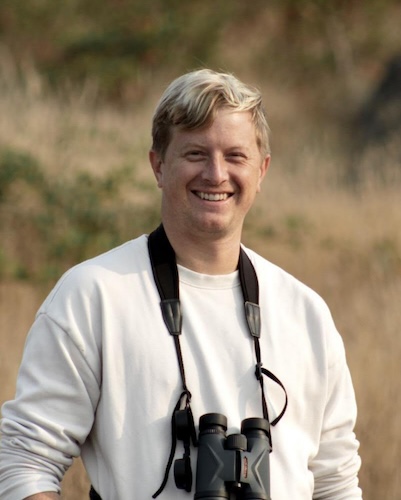Doherty Marine Biology Postdoctoral Scholars
Bowdoin recognized that the addition of a postdoctoral position would help support the teaching and research activities at the Schiller Coastal Studies Center, as well as develop a community of academics who might, in subsequent years, return to SCSC for continuing research as well as send their students to SCSC.
The Doherty position enhances the marine research and course opportunities available to students at Schiller and engages outside researchers with the College through symposia and workshops organized by Doherty post-doctoral scholars. Postdocs mentor undergraduates with summer research and honors research projects and write peer-reviewed publications with Bowdoin students as co-authors.
Recipients

2024: Christopher Wells
Christopher Wells is a community ecologist and anthozoan biologist with a focus on the reproductive biology and distributional ecology of cnidarians. His current research focuses on why soft corals in the Caribbean have continued to increase in abundance while hard corals, which build the reefs, have continuously declined. He has also studied anemone and coral ecology in Washington and introduced species in the Gulf of Maine.

2021-2023: Katie DuBois
Katie is a marine ecologist interested in how ecological and evolutionary feedbacks determine species resilience to environmental change. Her research focuses on seagrass ecosystem response to rising ocean temperatures. A primary goal of her research is to understand how physiological mechanisms determine response of individuals to environmental stress and how these processes scale-up to influence population and community dynamics. Katie received a B.A. in Biology from Bowdoin College, and a Ph.D. in Marine Ecology from the University of California- Davis.
Katie taught Life in a Changing Sea, Methods in Ocean Change Ecology, and Benthic Ecology (the latter two as part of the Marine Science Semester program.

2018-2019: Brittany Jellison
Brittany Jellison is a marine ecologist conducting research broadly interested in how coastal marine organisms are responding, acclimating and adapting to human-altered environments.
Brittany received her Ph.D. from the University of California Davis where she conducted research on ocean acidification.
Her thesis research focused on understanding how changing ocean chemistry will impact marine communities.

Spring 2014-2016: Sarah Kingston
Sarah Kingston is a molecular ecologist, and teaches courses for the Biology department and for the Bowdoin Marine Science Semester. Utilizing molecular tools to look at hybrid zones, Kingston has studied a wide variety of organisms from dolphins to birds to mussels.
Kingston is currently researching the genetic basis of mussel response to a changing oceanic environment.
She received a B.A. from William and Mary, an M.S. from the College of Charleston, and her Ph.D. at the University of Maryland.

2012-2012: Trevor Rivers
Trevor Rivers arrived at Bowdoin in June 2011 and immediately began working at the Bowdoin marine lab with Tamara Perreault (’12) studying bioluminescent-based predator avoidance in a marine worm. Trevor did his Ph.D. at Cornell University studying vision-based behavior in marine systems, with a particular focus on bioluminescence.
Trevor is also interested in the role of anthropogenic light (light pollution) on the behavior of marine animals, from the individual to the community level, and is concurrently working on a project studying the effects of light pollution on fouling community structure.
Trevor received his Ph.D. in Ecology and Evolutionary Biology from Cornell University, 2007, and B.S. major, marine biology, minor in chemistry, Magna Cum Laude, Western Washington University, 2000.

2008-2010: Daniel Thornhill
Before arriving at Bowdoin College in 2008, Dan Thornhill was a postdoctoral scholar at Auburn University. Dan’s research focuses on coral reef biology and deep-sea organisms, and at Bowdoin he investigated corals’ adaptivity to changing ocean conditions and deep-sea worms that thrive on the seafloor near hydrothermal vents and methane seeps.
During his time at Bowdoin, Dan advised seven summer research students and three honors projects. He taught a course on coral reef biology and evolution, and led an academic spring break trip on coastal ecology in south Florida.

2005-2008: Jonathan Allen
Jon Allen received his PhD from the University of North Carolina at Chapel Hill in 2005 and was soon after selected as the first Doherty Marine Biology Scholar. Throughout the years, he conducted research with many students. He worked with 6 students on very different topics, from the larval growth of Maine seastars to egg capsule distribution in Nucella lapillus as a strategic maternal investment and the predation of benthic and plankton invertebrates in Harpswell sound. Allen also advised two honors projects. However, he also engaged with students in the classroom, teaching the upper level course Marine Larval Ecology in 2004-2005, as well as a nonmajors science course Evolution in America in 2007-2007 at the college.
He organized two symposiums held at Bowdoin, both exhibiting current research about the state of marine ecology in Maine. Collectively, these symposiums brought 52 researchers to the college. After three years as the Doherty Postdoctoral Scholar, Allen accepted a teaching position at Randolph Macon College in Ashland, Virginia. After a year at Randolph Macon College, Jon accepted a teaching position at the College of William and Mary.